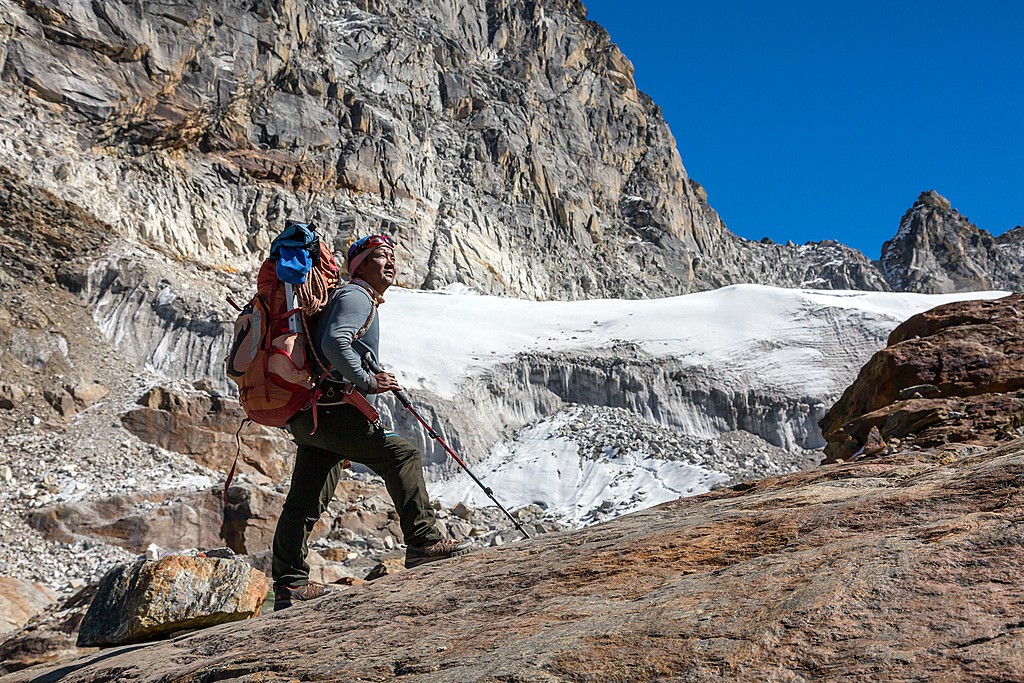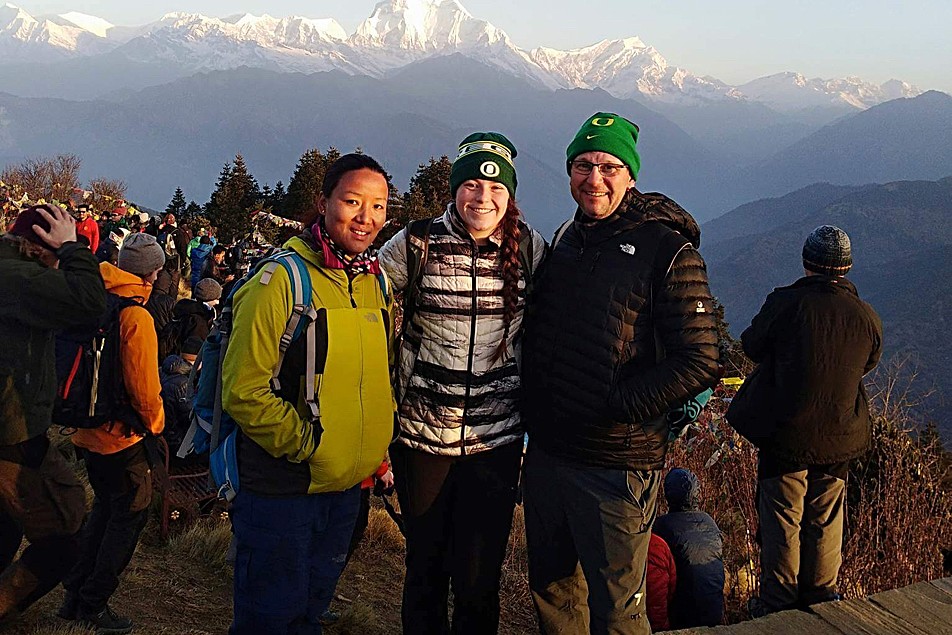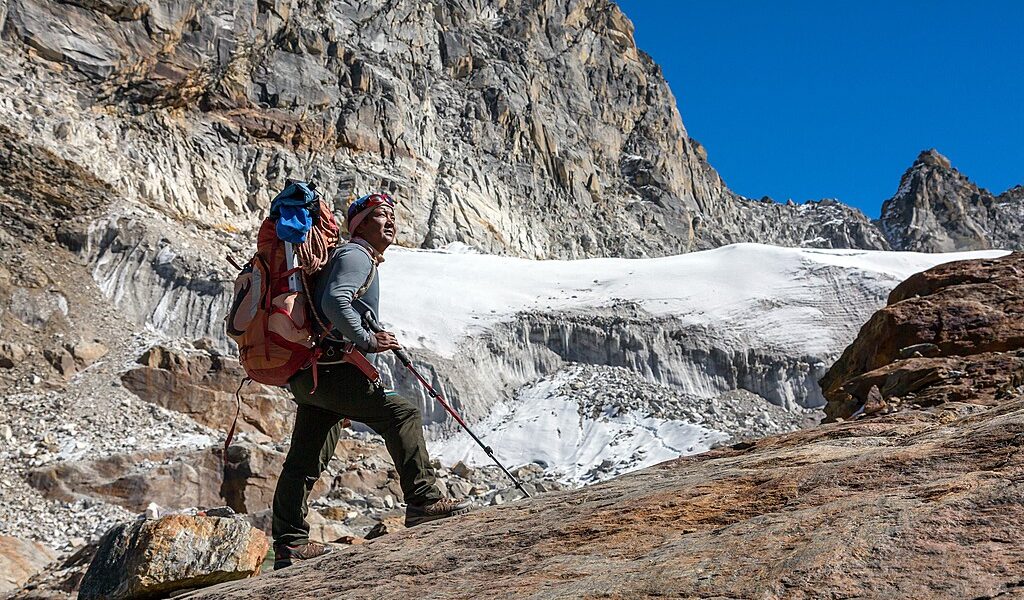
Traveling with a great guide is important in Nepal—particularly at high altitude. Read on for more information about the benefits of hiring local, learn what to expect, and meet some of the country’s top trekking and tour guides.
## Embark on an Enriched Journey: The Indispensable Role of Guided Travel in Nepal
Nepal, a land of towering peaks, vibrant cultures, and untamed wilderness, beckons travelers with its unparalleled beauty and adventure. Whether your heart yearns for conquering the majestic mountains on a trek, delving into the historical depths of its cities, experiencing the raw thrill of a wildlife safari through the lush jungle, or navigating the exhilarating rapids while rafting on a fast-flowing river, Nepal offers an unforgettable experience. Within this tapestry of adventure, the role of a guide transcends mere logistical support; it becomes the cornerstone of a safe, enriching, and truly memorable journey.
While many travelers may initially consider navigating Nepal’s wonders independently, it’s crucial to understand the profound impact a skilled and knowledgeable local guide can have on shaping your adventure. From ensuring your safety amidst challenging terrains to unlocking hidden cultural nuances and fostering meaningful connections with the local communities, a guide can elevate your trip from a simple vacation to a life-altering experience.
Even seasoned independent travelers can benefit immensely from the expertise of a local guide. Hiring a guide doesn’t necessarily mean sacrificing the freedom of independent exploration. Instead, it allows you to handpick specific experiences to enhance with expert insight. Whether you’re seeking to conquer challenging mountain biking trails, embark on a multi-day trek through breathtaking landscapes, or immerse yourself in the rich tapestry of local culture, a guide can provide invaluable support and knowledge tailored to your unique interests and preferences.
## Unlocking the Treasures of Nepal: Why Hire a Local Guide?
The decision to hire a local guide is an investment in your safety, understanding, and overall enjoyment of Nepal. The advantages are numerous and contribute significantly to a more fulfilling and authentic travel experience.
### **Gaining Unparalleled Local Expertise:**
Imagine having access to a treasure trove of knowledge, ready to be unlocked at any moment. That’s precisely what a local guide provides. More than just a navigator, your guide is a cultural ambassador, a storyteller, and a walking encyclopedia of local wisdom. They possess an intimate understanding of the nuances of historic sites, revealing their hidden secrets and untold stories. They expertly navigate even the most challenging and unmarked trekking trails, ensuring you stay on course and discover breathtaking vistas.
A local guide’s language skills enable seamless communication, bridging cultural gaps and allowing you to connect with the locals on a deeper level. Whether you’re interacting with the warm-hearted Sherpa communities in the Everest region, the artistic Newar people of the Kathmandu Valley, the resilient Gurung communities nestled in the Annapurna region, or any other of Nepal’s diverse ethnic groups, your guide acts as a cultural interpreter, facilitating meaningful interactions and fostering mutual understanding.
### **Empowering Communities: Supporting the Local Economy**
By choosing to hire a local guide, you’re directly contributing to the economic well-being of the communities you’re visiting. You’re providing a valuable job opportunity and empowering individuals to support themselves and their families. When local guides are fairly compensated, they often reinvest their earnings back into their communities, fueling local development and contributing to a more sustainable tourism model. This creates a positive ripple effect, benefiting not only the individual guides but also the entire community, fostering a sense of pride and ownership in preserving their cultural heritage and natural environment.
### **Traveling with Confidence: Safety and Comfort Ensured**
The assurance that someone experienced is looking out for your best interests is priceless. A local guide provides invaluable peace of mind, allowing you to relax and fully immerse yourself in the beauty and wonder of Nepal. They are always one step ahead, anticipating potential challenges and proactively addressing them to ensure your safety and comfort.
In the context of trekking, the expertise of local guides is paramount, particularly in Nepal, where you may be traversing high-altitude passes and navigating potentially hazardous terrain. Their expert decision-making skills are crucial in mitigating risks, and they are trained in emergency protocols, including evacuation procedures, should the need arise. This ensures that you can trek with confidence, knowing that you are in capable hands.
And as a bonus, you’ll forge a lasting friendship in Nepal, creating a connection that extends far beyond the duration of your trip!
## A Spectrum of Expertise: Exploring the Different Types of Guides in Nepal
Nepal boasts a diverse array of specialized guides, each with a unique skillset and area of expertise to cater to a wide range of interests. Whether you’re a culture enthusiast, a seasoned trekker, a yoga practitioner, or an adrenaline junkie, you’ll find a guide perfectly suited to your passions.
The types of guides available in Nepal include:
* **Culture and Tour Guides:** These guides specialize in showcasing the rich history, cultural heritage, and artistic traditions of Nepal’s cities and historical sites.
* **Trekking Guides:** Highly experienced in navigating Nepal’s mountainous terrain, trekking guides lead you through breathtaking landscapes, ensuring your safety and sharing their vast knowledge of the local flora, fauna, and culture.
* **Yoga-Trekking Guides:** Combining the serenity of yoga with the adventure of trekking, these guides offer a holistic experience, incorporating mindful movement and meditation practices amidst the stunning Himalayan scenery.
* **Peak Climbing Guides:** For those seeking to conquer Nepal’s towering peaks, peak climbing guides provide the expertise, equipment, and support necessary for a safe and successful summit attempt.
* **Birding Guides:** Nepal is a paradise for birdwatchers, and specialized birding guides can help you spot and identify a vast array of avian species, enriching your understanding of the country’s biodiversity.
* **Safari Guides:** Venture into Nepal’s national parks and wildlife reserves with experienced safari guides, who will lead you on thrilling expeditions to observe tigers, rhinos, elephants, and other incredible wildlife in their natural habitat.
* **Rafting Guides:** Navigate Nepal’s exhilarating rivers with skilled rafting guides, who will ensure your safety and provide an unforgettable adventure through stunning canyons and rapids.
* **Kayaking Guides:** Explore Nepal’s waterways from a unique perspective with kayaking guides, who will teach you the fundamentals of kayaking and lead you on scenic paddling expeditions.
* **Paragliding Guides/Instructors:** Soar through the skies above Nepal with experienced paragliding guides and instructors, who will provide you with breathtaking aerial views of the Himalayas and surrounding landscapes.
* **Mountain Biking Guides:** Explore Nepal’s rugged terrain on two wheels with mountain biking guides, who will lead you on challenging and rewarding trails through stunning mountain scenery.
Regardless of the specific activity you choose, a great guide should possess certain essential qualities. They should be passionate about guiding, demonstrating a genuine enthusiasm for sharing their knowledge and love for Nepal. They should be compassionate and empathetic, making every traveler feel comfortable, confident, and supported. They should be environmentally conscious, promoting responsible travel practices and minimizing their impact on the fragile ecosystems they traverse. They should be flexible and adaptable, willing to adjust the itinerary as needed to accommodate your interests and preferences. They should be well-trained in emergency protocols, ensuring your safety in unforeseen situations. And above all, they should be filled with captivating stories and invaluable expertise to share, enriching your understanding and appreciation of Nepal’s unique culture and natural beauty.
## Investing in Expertise: Guide Training and Background
The professionalism and expertise of guides in Nepal are ensured through rigorous training and licensing requirements. All guides must be licensed by the National Academy for Tourism and Hotel Management (NATHM), a government organization responsible for setting and maintaining standards for the tourism industry. NATHM provides comprehensive practical and theoretical training sessions, led by experienced tourism and health experts. Trekking guides, in particular, receive specialized training on critical topics such as first aid, altitude sickness, rescue methods, and environmental conservation.
To qualify for a trekking guide license, applicants must have a minimum of a high school diploma. Tour guides are required to hold a bachelor’s degree, demonstrating a commitment to education and knowledge. Trekking guides must also gain practical experience by working as porters for at least two years before they can apply for a guiding license, providing them with valuable insights into the challenges and rewards of trekking in the Himalayas. Furthermore, trekking guides are required to update their first aid training every two years, ensuring they remain current with the latest safety protocols and best practices.
Many reputable tour operators and specialized travel agencies, including several of our own specialists, hold even higher standards for their guides. They require them to undergo yearly (or even more frequent) specialized training sessions, focusing on topics such as responsible travel practices, outdoor survival skills, and pre-season refresher courses, ensuring they are consistently providing the highest level of service and expertise.
## More Than Just a Navigator: The Multifaceted Role of a Guide During Your Trip
As Mingma Sherpa, a Big Time Holidays specialist, eloquently puts it, “A guide’s role during a trip is not just to take travelers from A to B, but to make the whole process interesting, enriching, and engaging.” Beyond handling logistical details such as securing trekking permits, arranging transportation and accommodations, and coordinating meals, your guide acts as a cultural ambassador, a problem-solver, and a trusted companion.
Your guide must be fully knowledgeable about the areas they are taking travelers to, sharing fascinating insights into the local history, culture, and environment. They must always prioritize safety, making informed decisions to mitigate risks and ensure your well-being. After all, your guide is the one who will know how to modify your trek based on weather conditions, handle emergency situations with competence, and provide reassurance when challenges arise.
Furthermore, your guide serves as the essential liaison between you and your specialist, providing frequent updates, relaying important messages, and ensuring that your trip unfolds seamlessly. They are your advocate on the ground, ensuring that your needs are met and that your experience exceeds your expectations.
## Fair Compensation and Ethical Treatment: Ensuring a Sustainable Future for Guides
Ensuring fair salary and benefits for guides is crucial for promoting ethical tourism and creating a sustainable future for the industry. The minimum wage for guides and porters is established by tourism authorities, through an agreement between the Trekking Agencies’ Association of Nepal (TAAN) and the Workers Union. Reputable tour operators adhere to these regulations, and many often pay above the minimum requirement, recognizing the value of their guides’ expertise and dedication. Salary levels are also determined by factors such as experience, skills, knowledge, group size, and the trekking area.
While wages remain relatively low compared to those of western guides, highly trained and experienced guides, particularly those who speak foreign languages and hold international certifications in wilderness survival, can earn significantly more, sometimes between $50-$100 USD per day. The high level of competition within the industry incentivizes guides to invest in their own training and knowledge, further enhancing their skills and professionalism.
Our specialists are deeply committed to providing respectful and fair working conditions for their guides and porters, recognizing that their well-being is essential to providing exceptional experiences for our clients. This commitment includes providing benefits such as insurance coverage, which is not always compulsory, demonstrating a genuine concern for their health and safety. As Chhewang Lama, another esteemed Big Time Holidays specialist, aptly states, “They look after our clients, so in return, we look after them.”
## Building Connections: Meeting Your Guide and Preparing for Your Adventure
For treks, you will typically meet your guide and a representative from the trekking agency at a pre-trek briefing, usually held the day before your trek commences. During this briefing, your guide will outline the planned route, answer any trek-specific questions you may have, and provide valuable insights into the challenges and rewards that lie ahead. The office representative will provide a local contact number and other essential information, such as departure times and locations for renting any additional gear you may need.
For sightseeing tours, your city guide will typically meet you at your hotel on the day of your tour. Depending on the specifics of your trip itinerary, you may be introduced to your guide earlier by your local representative or specialist, allowing you to build a rapport and discuss your interests and expectations.
If you would like to know who your guide is in advance of your arrival in Nepal, simply ask your specialist after you have booked your trip. You can also make special requests, such as requesting a female trekking guide or a guide who speaks a particular language, allowing you to personalize your experience and ensure that you feel comfortable and connected throughout your journey.
## Meet the Faces Behind the Adventures: A Glimpse into Our Local Guides
Our specialists meticulously select their guides, recognizing the profound impact that this choice has on your overall experience. These guides are not just navigators; they are cultural ambassadors, storytellers, and passionate advocates for Nepal. Let’s meet a few of the exceptional local guides who may have the privilege of guiding your adventure in Nepal:
### Mingmar Sherpa, Solukhumbu
(Description as in original text)
### Jay San, Kathmandu
(Description as in original text)
### Maila Gurung, Mugling
(Description as in original text)
### Pema Futi Sherpa, Lukla
(Description as in original text)
By choosing a guided experience in Nepal, you are not simply hiring a service; you are investing in a journey that will transform your perspective, deepen your understanding, and create memories that will last a lifetime. Embark on your adventure with confidence, knowing that you are in the capable hands of a local expert, ready to unlock the hidden treasures of this extraordinary land.

B-1761

